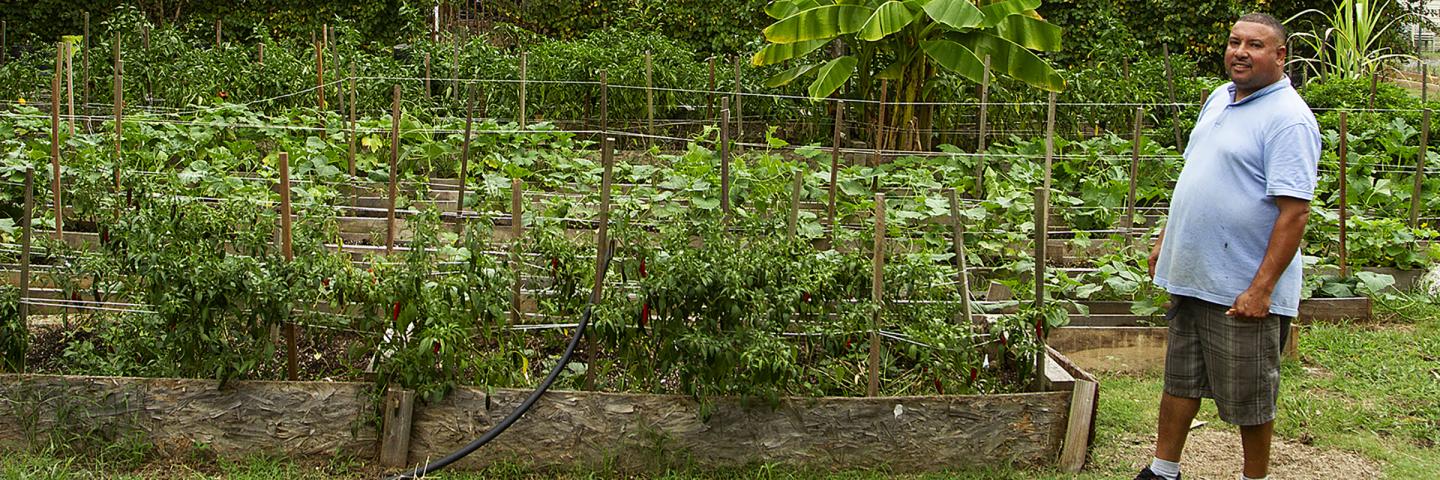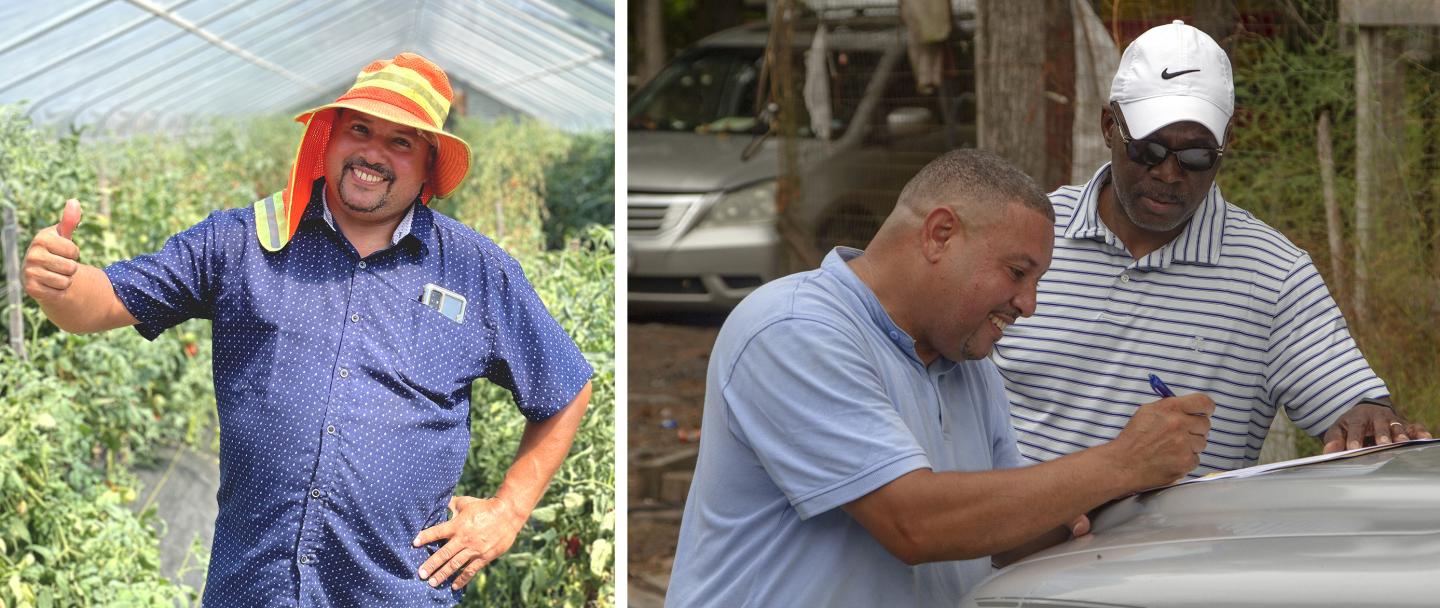Brunswick Grower Adapts Big Dreams to Small Spaces

Pedro Lopez Morel uses just about every square foot of his property in Lawrenceville to produce fruits and vegetables favored by immigrants from Central America and the Caribbean islands but seldom grown commercially in Virginia.
LAWRENCEVILLE, Va. – With only nine tenths of an acre at his disposal, Pedro Lopez Morel is redefining efficiency in agricultural production. Almost every square inch of the Brunswick County property not occupied by his house and driveway is farmed and it’s tempting to speculate on how much more he could do with just a little more land.
Lopez grows more than 25 varieties of fruits and vegetables in this minimal space. His backyard is already home to three high tunnels, two purchased with financial assistance from USDA’s Natural Resources Conservation Service and one home-built model. NRCS is providing financial assistance for one of two more going in this fall.
The front yard is also devoted to gardening, with a tropical plantain tree popping up in the middle and raised beds for cabbages at the base of the fences. A cold storage area Lopez built for produce occupies the side yard. While the operation looks like the product of at least a decade of hard work, Lopez didn’t begin his career as a grower until 2017.
“I just can’t come up with another example of someone doing so much in so short a time,” said Harvey Baker, the NRCS district conservationist based in Lawrenceville. “It’s really incredible.”
It's no less incredible than the life story of Lopez, who emigrated to the United States from the Dominican Republic 27 years ago at age 21. He came to his new country with restaurant kitchen skills, gradually working his way up from dishwasher to chef as he moved from New Jersey to Virginia.
Lopez’s entrepreneurial spirit was awakened when he noticed his employer was having difficulty maintaining an adequate supply of fresh fruits and vegetables and paying a premium price for what he could buy. Lopez thought he could do better and boost his income in the process. The final piece slid into place when his employer assisted Lopez on the purchase of his house and lot.
“There are members of my family (in the D.R.) who are farmers,” Lopez said, “but I was never interested. Now, I just love growing things and want to do it for the rest of my life. I feel like I’m living a dream, except that it wasn’t a dream I knew I had.”
Lopez, who usually answers to the nickname “Ari,” turned to Virginia State University’s Small Farm Outreach Program for education and soon discovered that high tunnels would be essential to his success. He reached out to NRCS for assistance in funding these structures, which enable him to provide produce at times of year when other growers do not. He also found a market niche, selling fruits and vegetables popular with immigrants from Central America and the Caribbean islands but rarely grown commercially in the U.S.
“Think about this,” said Leonel Castillo, the VSU Small Farm Outreach Program’s (VSU-SFOP) Hispanic outreach assistant. “Ari is usually growing between 25 and 30 varieties of plants here and there with a learning curve attached to each one. What he assimilated in a short amount of time doesn’t always seem possible.”
“I was particularly impressed by how well he was able to grow tropical plants in Virginia summer weather,” said Dr. Edwin Martinez Martinez, NRCS’ state conservationist for Virginia. “When I visited in September, I saw pineapples, guavas, limes, avocados and the plantain tree thriving outdoors. I’m sure he’ll move them into the high tunnels for the winter, but it was great to see how his desire to try new things has been rewarded.”
Lopez soon moved from restaurant worker to restaurant supplier while simultaneously establishing himself as a featured vendor at the farmer’s market in nearby South Hill. He later established an alliance with a group of Amish farmers from Charlotte County, who provide his market table with top-quality produce and other items to supplement any shortfalls in home production.
“No matter when my truck gets to South Hill,” he said, “there’s usually a line that’s formed in front of my area before I set up. A lot of my customers are Hispanic, and I think they appreciate the little things I do to make my food taste more like what they remember.”
Those special touches include harvesting red beans a week or two before most growers would consider them ripe. He said the beans have a higher water content at that stage of their growth and should be handled not as a dry bean but as a fresh vegetable, which better suits Latin American and Caribbean palates.
The former student is now a teacher, serving as a mentor farmer for VSU’s Small Farm Program. He frequently hosts clinics on growing some of his specialty products in Virginia’s climate. Lopez can also share some lessons in resilience along the way. When the COVID pandemic closed most of the nearby markets, Lopez ran a successful “you pick ‘em” operation out of his house to not only survive but thrive for almost two years.
“I think I’m good at learning,” he said. “When I was washing dishes in New Jersey, I learned how to be an Italian cook just by watching our chef whenever I could. When the chef left, the owner was amazed at how well I could prepare everything on the menu.”
Lopez, who lives alone, does it all without any free family labor. He employs about a half-dozen part-time workers who tend the gardens while their boss sells at farmer’s markets and is still on the lookout for new opportunities. Castillo jokes that Lopez must operate on 440 volts while the rest of us are stuck at 110.
“I do not allow myself to be tired,” he said. “Maybe later in life… maybe.”

Left: Pedro Lopez Morel gives a "thumbs up" to his high tunnel tomato crop (Photo: Dr. Edwin Martinez). Right: NRCS District Conservationist Harvey Baker gets Lopez's signature on a contract for his third NRCS-funded high tunnel (Photo: John Markon).

